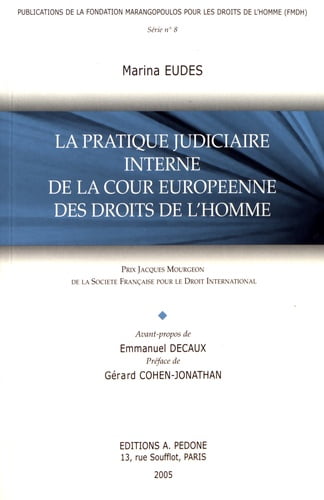
CYPRIOT CASES BEFORE THE ECtHR: A PRACTICAL GUIDE
Project on Foster transparency of judicial decisions and enhancing the national implementation of the ECHR
Author(s): Eudes, Marina
The thesis at hand, awarded the human rights prize of the French Society of International Law (SFDI), constitutes an indispensable tool for all jurists who wish to understand, both in theory and in practice, the specific function of the European Court of Human Rights, its judicial philosophy, its collective dynamics and the « fabrication » of its case-law. Being the result of an intimate knowledge of the European Convention on Human Rights, it draws up, at a critical moment in its history, an exhaustive assessment of 50 years of operation of the Strasbourg Court, while lucidly considering its future, linked to Protocols Nos. 11 and 14. It thus sheds new light on the European jurisprudence, giving it its full meaning and scope.
Alongside the lessons on the organization and procedures of the Court, essential issues relating to the determinants and exercise of the function of judging are being considered. It emerges that the European Court of Human Rights has always sought to guarantee its legitimacy by scrupulously respecting the classic criteria of good administration of justice, namely independence and representativeness but also the imperatives of speed, publicity and fairness. It was also guided by the priority objective of ensuring the effectiveness of the protection of human rights, in a harmonious balance between judicial prudence and the development of rights.
